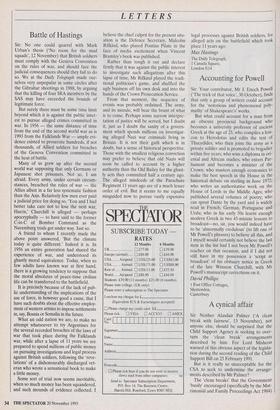LETTERS Battle of Hastings
Sir: No one could quarrel with Mark Urban's thesis (`No room for the mad squads', 12 November) that British soldiers must comply with the Geneva Convention on the rules of war, and should face the judicial consequences should they fail to do so. We at the Daily Telegraph made our- selves very unpopular in some circles after the Gibraltar shootings in 1988, by arguing that the killing of four IRA members by the SAS may have exceeded the bounds of legitimate force.
But surely there must be some time limit beyond which it is against the public inter- est to pursue alleged crimes committed in war. In 1956 — the same distance of time from the end of the second world war as is 1993 from the Falklands War — ample evi- dence existed to prosecute hundreds, if not thousands, of Allied soldiers for breaches of the Geneva Convention committed in the heat of battle.
Many of us grew up after the second world war supposing that only Germans or Japanese shot prisoners. Not so, I am afraid. Every army, under certain circum- stances, breached the rules of war — the Allies albeit in a far less systematic fashion than the Axis. Relatively few men ever paid a judicial price for doing so. 'You and I had better take care not to lose the next war, Harris,' Churchill is alleged — perhaps apocryphally — to have said to the former C-in-C of Bomber Command as the Nuremburg trials got under way. Just so.
A friend to whom I recently made the above point answered, 'But the climate today is quite different.' Indeed it is. In 1956 an entire generation had shared the experience of war, and understood its ghastly moral equivalence. Today, when so few adults have known war at first hand, there is a growing tendency to suppose that the moral absolutes of peace-time civilian life can be transferred to the battlefield.
It is precisely because of the lack of pub- lic understanding of the implications of the use of force, in however good a cause, that 1 have such doubts about the effective employ- ment of western armies to impose settlements in, say, Bosnia or Somalia in the future.
What an odd nation we are, to make no attempt whatsoever to try Argentines for the several recorded breaches of the laws of war that took place during the Falklands war, while after a lapse of 11 years we are prepared to spend millions of public money on pursuing investigations and legal process against British soldiers, following the 'reve- lations' of a dishonourably discharged vet- eran who wrote a sensational book to make a little money.
Some sort of trial now seems inevitable, when so much money has been squandered, and such mounds of evidence collected. I believe the chief culprit for the present situ- ation is the Defence Secretary, Malcolm Rifkind, who played Pontius Pilate in the face of media excitement when Vincent Bramley's book was published.
Rather than tough it out and declare firmly that it was against the public interest to investigate such allegations after this lapse of time, Mr Rifkind played the tradi- tional politician's game, and shuffled the ugly business off his own desk and into the hands of the Crown Prosecution Service.
From that moment, the sequence of events was probably ordained. The army, and its morale, will bear the brunt of what is to come. Perhaps some narrow interpre- tation of justice will be served, but I doubt it, just as I doubt the sanity of a govern- ment which spends millions on investigat- ing alleged Nazi war criminals living in Britain. It is not their guilt which is in doubt, but a sense of historical perspective. Those with the smallest religious conviction may prefer to believe that old Nazis will soon be called to account by a higher authority than the Old Bailey for the ghast- ly acts they committed half a century ago. The alleged misdeeds of the Parachute Regiment 11 years ago are of a much lesser order of evil. But it seems to me equally misguided now to pursue vastly expensive legal processes against British soldiers, for alleged acts on the battlefield which took place 11 years ago.
Max Hastings
The Daily Telegraph, 1 Canada Square, London E14










































































 Previous page
Previous page